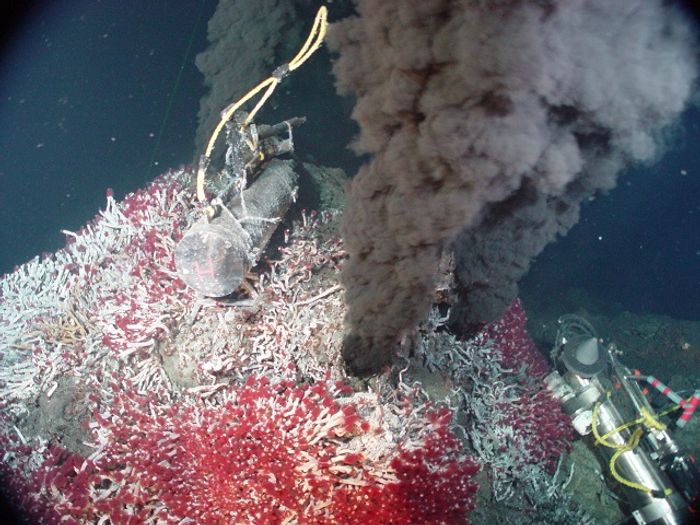Microsoft, BMW, Enviro Orgs, Protest Deep-Sea Mining Proposals at ISA Meeting, Claiming Global Food Security Threats

(EnviroNews World News) — Kingston, Jamaica — Critics including a slew of environmental NGOs, scientists and governments, as well as large manufacturers like Microsoft, Samsung, BMW and Volvo, are all calling for a moratorium on deep-seabed ocean mining operations that could be enabled by the International Seabed Authority (ISA) at this month’s scheduled meeting. Environmentalists say a ruling in favor of industrial interests “could open floodgates” for mining operations that would threaten biodiversity and fishing, while potentially exacerbating climate change issues as well.
The ISA is an international body established by the United Nations (UN) to regulate approximately half of the world’s ocean areas – places that lie beyond national jurisdictions. The agency could vote to allow more ocean mining at the meetings scheduled at its home-base in Kingston, Jamaica from December 6-15.
Any new regulations passed at the ISA meeting could go into effect within two years. Critics have cited a recent study indicating that places being sought for ocean mining overlap with fishing areas vital to local and global food security. There have also been calls to postpone the meetings all together due to travel concerns related to the COVID-19 virus.
Joachim Claudet, a researcher at the Centre National de la Recherche Scientifique (CNRS) in Paris, France, is among those sounding the alarm, writing this in a press release:
The deep-sea encompasses some of the most vulnerable ecosystems on earth, with recovery time, if any, longer than anywhere else. Mining would alter these ecosystems in ways that are in full contradiction with the sustainable pathways our societies should take to ensure peoples’ well being in the long term.
Recent objections to the potential dangers of deep-seabed mining have included letters from the Deep Ocean Stewardship Initiative, as well as members of the ISA’s own Latin American and Caribbean group. A global coalition of more than 600 scientists and policy experts from more than 44 countries has also signed a statement calling for a moratorium, while big business entities including BMW, Volvo, Samsung, Philips, Volkswagen Group, Triodos Bank and Patagonia have joined the Business Statement Supporting a Moratorium on Deep Seabed Mining.
The Deep Sea Conservation Coalition (DSCC) is among the NGOs leading the call for a halt on all deep-seabed ocean mining — the process of retrieving mineral deposits from ocean areas below 200 meters. Depleting terrestrial resources of metals including copper, nickel, aluminum, manganese, zinc, lithium and cobalt has led to growing interest in deep sea deposits.
The DSCC has also drawn attention to what the organization says are conflicts of interest within the ISA, contending that a troubling lack of transparency at the ISA calls for institutional reform. Under the existing rules, the exploration contracts approved by the ISA’s Legal and Technical Commission (LTC) remain confidential. Contractors must submit annual reports on their activities to the LTC and the ISA Secretariat, but these reports are not made available to the ISA membership (much less to the public).
In an email to EnviroNews, Emma Critchley, a project scientist at the University of California, Santa Barbara, pointed out that Rule 11 of the LTC states that “Members of the Commission shall have no financial interest in any activity relating to exploration and exploitation in the Area.” Critics are concerned however that the agency’s transparency issues include hiding violations of Rule 11.
Sian Owen, the DSCC’s global strategy coordinator, notes that the adoption of Motion 069 at the IUCN World Conservation Congress in September was a ringing endorsement from both governments and civil society that urged for caution in how the planet’s oceans are managed. The motion called for an indefinite moratorium on deep-sea mining, but Owen says the ISA isn’t getting the message. She wrote in an email:
The DSCC has had no official response from the ISA to our calls for a moratorium. There is instead a clear drive by the Secretariat and a handful of the Member States (several of whom are influential in the LTC and Council) to accelerate the process of finalizing and adopting the regulations that would allow mining to proceed. Other Member States are less comfortable with this push, for a range of different reasons, and have raised objections to various aspects of the process. But none has, yet, come out calling for a moratorium.
Dr. Douglas McCauley, a professor of ocean science at the University of California, Santa Barbara, summarized the biological ramifications in play for the world’s oceans in a press release, when he wrote:
Decisions made at the International Seabed Authority may shape the next few centuries of ocean health. If ocean mining is green-lighted it could let the genie out of the bottle and significantly threaten important species, inflict irreversible damage to sensitive ocean habitats, source toxins into seafood via contaminated water plumes and disrupt key carbon stores in the deep ocean critical to combating climate change. Those headed to these meetings in Jamaica must know that hundreds of ocean scientists have warned that more research is desperately needed to understand these impacts before mining is allowed to begin. It’s remarkable that the future of such a vast area of our ocean will be decided in a meeting that almost nobody knows is happening.
Despite the COVID-based objections, the ISA meeting remains scheduled for December 6-15 in Kingston, Jamaica with live-streaming to take place at https://isa.org.jm/web-tv.
FILM AND ARTICLE CREDITS
- Greg Schwartz - Journalist, Author



